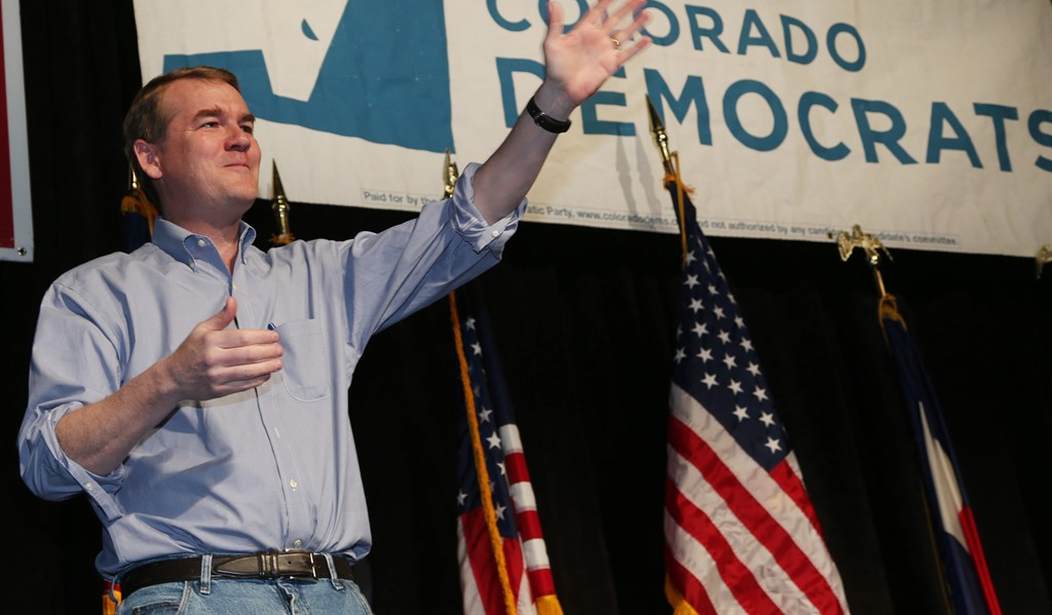No kidding. In this case, however, the Democrat is preaching to the Colorado choir. At a town hall yesterday, Michael Bennet rejected the idea that support for a single-payer health care system should be a litmus test, nor is it even a good idea. Given that the state just voted down its own version of socialized medicine, Bennet’s probably on safe ground here:
In a dialogue this week largely focused on defeating efforts to repeal and replace the Affordable Care Act, U.S. Sen. Michael Bennet dismissed another system elsewhere along the ideological spectrum: government-sponsored, or single-payer, health care.
Bennet, speaking Monday night at a town hall in Greeley, said the existing system should be the focus.
“I think we should have a discussion about how to expand Medicare, so that more people can be part of it or maybe be able to buy it and how to do the same with Medicaid.”
How close did ColoradoCare come to passage? Not very. After an analysis showed that the system would bankrupt the state in the long run, only 21% of voters backed it. Furthermore, Greeley’s in the middle of Trump country in Colorado; he beat Hillary by over 30,000 votes out of roughly 123,000 cast. Progressives in Denver and Boulder counties will undoubtedly not cotton to that kind of talk about single-payer, but they’re pretty clearly the fringe in Colorado on this issue.
Bennet instead suggested expanding Medicaid as an alternative. Missouri Senator Claire McCaskill, who will have to run for re-election in a Trump state next year, made the same suggestion last week — although she didn’t rule out single-payer, either:
And if we can get those health care costs down through this comparison shopping. And if we can figure out a way to make sure that comparison-shopping doesn’t go away with a single-payer system, that we don’t lose the value of competition, then I think we could consider it. In the meantime, what I think that we should do is put what is a quasi-public option on the exchanges. People between the ages of 55 and 65 are the people that need health insurance the most, and in the Republican bills are going to pay the most.
Clearly, red-state Democrats have trouble swallowing the “litmus test” that the Bernie Sanders wing wants to impose on candidates next year. They may find themselves under attack from the progressives that see complete government control as the pinnacle of government health care policy, no matter what the costs may be — fiscally or politically:
Sanders has decided the moment is right to launch his proposal for the single-payer health insurance system that helped form the backbone of his presidential message. And Democrats who don’t get behind it could find themselves on the wrong side of the most energetic wing of the party — as well as the once and possibly future presidential candidate who serves as its figurehead.
The Vermont senator himself has not explicitly said he’ll support primary challenges to those who won’t support his push for a so-called Medicare-for-all health care plan. But there are plenty of signs that Sanders and his allies view the issue as a defining moment for Democratic lawmakers.
“Our view is that within the Democratic Party, this is fast-emerging as a litmus test,” said Ben Tulchin, the pollster for Sanders’ White House run.
IBD, which has polled extensively on this issue, triple-dog-dares Democrats to use it in next year’s elections:
The IBD/TIPP poll asked a follow-up question, noting that some experts say the high cost of single payer would “lead to reduced access to high quality health care services, as well as longer wait times.”
This is precisely what has happened in every country that has imposed single payer on their people, and on single payer programs like the Veterans Health Administration here at home. Government underpays providers, shortages result, and patients wait interminably for “free” treatments, if they can get them at all.
When that prospect is even hinted at, support for single payer drops to 50%. And that’s only because Democrats remain firmly behind it. In fact, 65% of Democrats still support single payer when these side effects are mentioned, compared with 29% of Republicans and 49% of Independents. And, again, these numbers include only those following the debate closely. …
So let Democrats demand that every single candidate running for office pledge to support single payer. It will show the public just how far out of the mainstream the party has drifted, and it will reveal their true intentions of imposing failing European-style socialism on American soil.
And it will give Republicans the chance to offer a clear alternative — market-based solutions that will actually bring down costs and improve quality.
Er … isn’t that the opportunity Republicans had this spring and summer? Be careful what you wish for. That briar patch might be just another big trap, too.








Join the conversation as a VIP Member